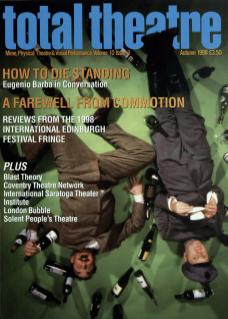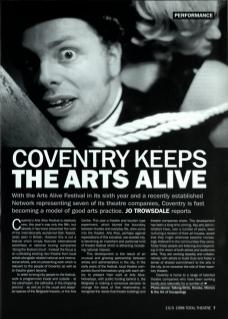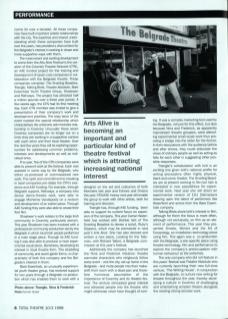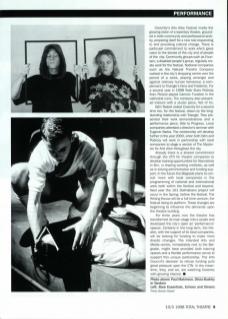Coventry's Arts Alive Festival is relatively new, this year's was only the fifth, but already it has twice presented the work of the internationally acclaimed Odin Teatret, rarely seen in Britain. However, this is not a festival which simply features international celebrities or national touring companies 'doing the festival circuit'. Instead the focus is on cultivating exciting new theatre from local artists alongside related national and international artists, and on presenting work which is relevant to the people of Coventry as well as to theatre-goers beyond.
In order to bring city people to the festival, work is programmed inside and outside – at the canal basin, the cathedral, in the shopping precinct – as well as in the usual and adapted spaces of the Belgrade theatre, or the Arts Centre. This year a theatre and tourism type experiment, which blurred the boundary between theatre and everyday life, drew some into the theatre. Arts Alive, perhaps against expectations of this industrial, war-scarred city, is becoming an important and particular kind of theatre festival which is attracting increasing national interest.
This development is the result of an unusual and growing partnership between artists and administrators in the city. In the early years of the festival, local theatre companies found themselves vying with each other to present their work at Arts Alive. Nowadays, with public funding behind it, the Belgrade is making a conscious decision to change the basis of that relationship, to recognise the needs that theatre buildings and theatre companies share. This development has been a long time coming. Key arts administrators have, over a number of years, been nurturing a revision of their art houses, aware that they might otherwise become increasingly irrelevant to the communities they serve. Today these people are listening and responding to the vision of both artists and audiences alike. They are working steadily and collaboratively with artists to build trust and foster a sense of shared commitment to the arts in the city, to re-conceive the role of their repertory theatre.
Coventry is home to a range of talented theatre companies who have been working locally and nationally for a number of years (some for over a decade). All these companies have built important artistic relationships with the city. The expertise and shared understanding which these companies have built over the years has provided a vital context for the Belgrade's interest in working in closer and more supportive ways with them.
The most recent and exciting development to come from the Arts Alive Festival is the creation of the Coventry Theatre Network (CTN), an A4E funded project for the training and development of seven core companies in collaboration with the Belgrade theatre. These companies comprise: The Snarling Beasties, Triangle, Talking Birds, Theatre Absolute, Bare Essentials Youth Theatre Group, Shaskeen and Pathways. The project has attracted half a million pounds over a three-year period. A few weeks ago, the CTN had its first meeting day. Each CTN member was invited to give a presentation of their company's work and development priorities. The easy tenor of the event marked the special relationship which characterises the artist / arts administrator relationship in Coventry. Unusually these seven Coventry companies are no longer out on a limb; they are working in a supportive context with each other and their local theatre. Over the next few years they will be exploring opportunities for addressing common problems, interests and developments as well as individual ones.
This year, five of the CTN companies were able to present work at the festival. Each was assisted in some way by the Belgrade, who either co-produced or commissioned new work. This spirit and commitment to investing in local companies pre-dates the CTN's existence and A4E funding. For example, through Belgrade support, Pathways, a company who devise dance-theatre work, were able to engage Micheline Vandepoely on a revision and development of an earlier piece. Through A4E funding they were also able to create their first film.
Shaskeen's work relates to the large Irish community in Coventry, particularly women. This year Shaskeen has been involved with a professional community production led by the Belgrade in which local Irish people performed in a main stage piece. Through its A4E funding it was also able to produce a more experimental visual piece, Banshees, developing its interest in ritual theatre forms. This straddling of community and avant-garde forms, is characteristic of both this company and the Belgrade's interest in them.
Bare Essentials, an unusually experimental youth theatre group, has received support for two years through a Belgrade co-production which has enabled them to work with a designer on the set and costumes of both Monsters last year and Echoes and Omens this year. CTN/A4E money next year will enable the group to work with other artists, both for training and direction.
Triangle has, through A4E funding, been able to support its current focus on expansion of the company. This year Carran Waterfield has worked with Debbie Isitt of The Snarling Beasties to devise a script, Ruby's Slippers, which may be premiered in next year's Arts Alive. She has also devised and written a new piece, Looking for the Tallyman, with Richard Talbot, a Belgrade commission at this year's festival.
Additionally the company has launched the Nina and Frederick initiative: theatre wannabe characters who religiously follow every event – visit the city, set up home in the Belgrade – and invite people into their makeshift front room with a dead pan and therefore humorous assumption of the importance of Coventry and its theatre festival. The venture stimulated great interest and attracted people into the theatre who might otherwise never have thought of coming. It was a complex marketing tool used by the Belgrade, not just for this effect, but also because Nina and Frederick, as apparently mainstream theatre groupies, were attending experimental small-scale work thus providing a bridge into the latter for the former. In their discussions with the audience before and after shows, they could articulate the views of ordinary people as well as acting as foils for each other in suggesting other possible responses.
Triangle's collaboration with Isitt is an exciting one given Isitt's national profile for writing provocative often highly physical, black and comic theatre. The Snarling Beasties are at present working in film but Isitt is interested in new possibilities for experimental work. Next year she will direct an experimental version of 101 Dalmatians drawing upon the talent of performers like Waterfield and actors from the Bare Essentials company.
Talking Birds share Isitt's interest in film, although for them the focus is more often, although not exclusively, on film as an element of performance. This year they presented Smoke, Mirrors and the Art of Escapology, an installation-technology piece using film. This again was a co-production with the Belgrade, a site-specific piece using theatre technology, film and performance to explore the company's preoccupation with human behaviour at the extremes.
The only company who did not feature in this year’s festival was Theatre Absolute who are currently launching their new full-time venture, The Writing House, in conjunction with the Belgrade, to nurture new writing for theatre throughout the year, thereby developing a culture in Coventry of challenging and entertaining scripted theatre alongside the existing strong devised work.
Coventry's Arts Alive Festival marks the growing vision of a repertory theatre, grounded in both community and professional activity, preparing itself for a new role responding to and provoking cultural change. There is particular commitment to work which gives voice to the stories of the city and of people of the city. Community groups such as Fountain, a disabled people's group, regularly create work for the festival. National companies such as the Natural Theatre Company worked in the city's shopping centre over the period of a week, playing amongst and against ordinary human behaviour, a complement to Triangle's Nina and Frederick. For a second year in 1998 Teatr Biuro Podrozy from Poland played Carmen Funebre in the cathedral ruins. The company also presented indoors with a studio piece, Not of Us.
Odin Teatret visited Coventry for a second time too, for this festival, drawn by the long standing relationship with Triangle. They presented their work demonstrations and a performance piece, Ode to Progress. Local companies attended a director's seminar with Eugenio Barba. The relationship will develop further in the year 2000, when both Odin and Podrozy will work in partnership with local companies to stage a version of The Mysteries for Arts Alive throughout the city.
Already there is a shared commitment through the CTN for theatre companies to develop training opportunities for themselves in film, in sharing working methods, as well as in solving administrative and funding support. In the future the Belgrade plans to consult more with local companies in the programming of national and international work both within the festival and beyond. Next year the 101 Dalmatians project will occur in the spring, before the festival. The Writing House will be a full-time venture, the festival being its platform. These changes are beginning to influence the demands upon the theatre building,
For three years now the theatre has transformed its main stage into a studio and developed the city's open air 'performance' spaces. Certainly in the long term, the theatre, with the support of its local companies, will be looking for funding to make more drastic changes. The intended Arts and Media centre, immediately next to the Belgrade, might have provided both training spaces and a flexible performance venue to support this unique partnership. The Arts Council's decision to refuse funding puts great pressure upon the CTN. In the meantime, they, and we are watching Coventry with growing interest.



